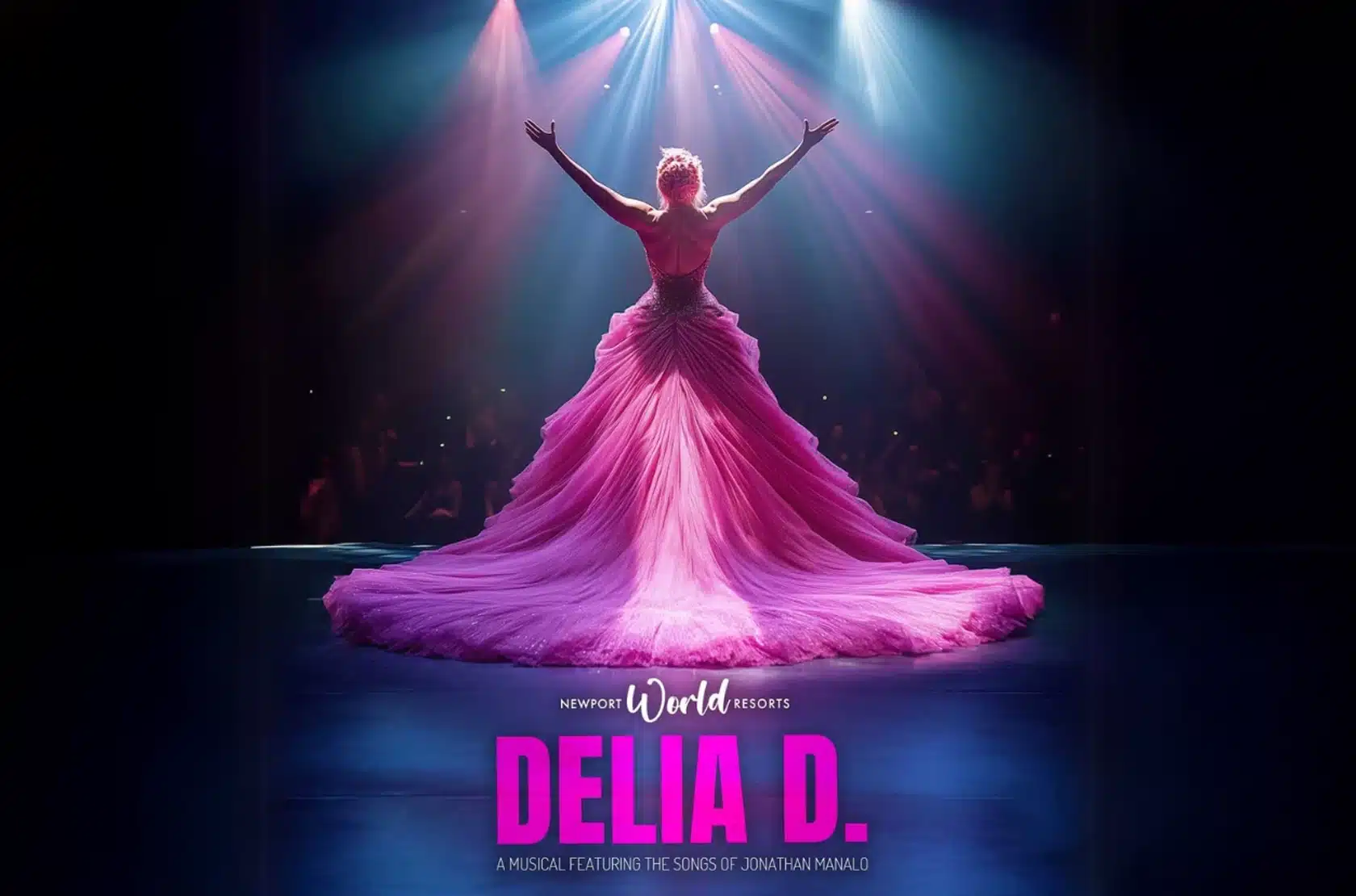
WHY NO ONE IS TALKING ABOUT DELIA D. — AND WHY IT’S TIME YOU SHOULD
There’s a woman commanding the stage at Newport World Resorts. And she’s not just singing — she’s setting it on fire. Delia D. isn’t just a musical. It’s a revelation. A reckoning. A resurrection of the kind of Filipino theatre we’ve all been yearning for. And yet… why is no one talking about it?
That ends now.
WHO IS DELIA D.?
Delia D. unpacks the glittering, gut-wrenching life of a performer who rose from the smoky corners of obscurity to the roaring center of fame. But not in the way you might expect. She’s not just a diva. Not just a dreamer. She’s a drag icon, born from fire, flair, and fearless ambition.
Before the bright lights and bursting applause, Delia performed as a lip-sync queen in a downtown drag club. She was a defiant artist from Osamis with nothing but grit, sequins, and a dream stitched into every performance. She didn’t just impersonate. She embodied. Her lips told stories. Her movements challenged norms. Her existence blurred the lines of art, gender, and glory.
That bold, bruised, and brilliant soul comes to life through Phi Palmos, one of Philippine theatre’s finest and fiercest. Known for unforgettable turns in Ang Huling El Bimbo, Dekada ‘70, Luna: The Musical, Mula sa Buwan, and Zsazsa Zaturnnah, Palmos doesn’t just play Delia. He transforms into her. With aching vulnerability and volcanic stage presence.
Eventually, Delia’s life shifts dramatically. She wins a nationwide reality singing competition — the kind where vocals matter, but popularity makes the final vote. With her voice, her story, and her raw humanity, she becomes the unexpected champion. In no time, “Just Delia” becomes a household name.
However, with every standing ovation comes scrutiny. Each crown carries a cost. The musical follows her rapid rise to fame. The tabloid whirlwinds. The whispered scandals. The complicated love affairs. And the unrelenting pressure of being a queer artist in a world that still hasn’t made room for all kinds of greatness.
Ultimately, Delia D. pulls us into a world where glitz collides with politics. Where femininity — especially when performed by the “wrong” body — becomes both weaponized and worshipped. It’s a world that asks hard questions. Who gets to be a star? Who gets to be celebrated? Who gets to survive the spotlight?
And yet, Delia answers. Not with apologies, but with a mic drop.
THE STAGE AS A CHARACTER
A THEATRICAL FEAST FOR THE SENSES

Delia D. isn’t just a musical. It’s an all-out immersion. A full-bodied spectacle that grabs you by the collar, powders your face in shimmer, and drags you into the heart of a story bursting with life, color, and unapologetic flair.
The set design plays with genre. One moment, you stand behind the shimmering silver-beaded curtains of a drag bar’s backstage — chaotic, glitter-drenched, and alive with pre-show jitters. The next, you face the harsh, high-stakes glow of a televised talent stage. It echoes the frenzied world of Pilipinas Got Talent, where Delia’s rise to fame began. The transitions feel fluid, theatrical, and cinematic. Rotating platforms, mirrored ceilings, and glowing panels carry the audience through decades, dimensions, and delusions.
Lighting plays a central character of its own. Harsh fluorescents buzz during Delia’s grueling rehearsals. Golden ambers bathe her triumphant returns. Pulsing pinks and violets drench the drag club in rhythm and rebellion. Spotlights don’t just highlight moments — they tell truths.
The costume design dazzles. Rhinestone-encrusted gowns catch the light with every turn. Show-stopping wigs defy gravity. Sharply tailored suits scream both style and story. Each wardrobe change marks a chapter in Delia’s metamorphosis — from humble performer to a national sensation. The makeup deserves its own curtain call. It delivers looks that are bold, bruised, beautiful, and deeply human.
But what makes Delia D. unforgettable is how the production doesn’t just unfold on stage. It envelops the audience. Laughter ricochets off the walls. Gasps ripple in unison. Applause arrives not just at the end of songs, but mid-scene — spontaneously — because the story compels it. The entire theatre becomes part of the act. It’s a sacred space where drag meets drama. Where memory meets music. Where every second bursts with spectacle.
This isn’t just production design. It’s world-building. And in Delia D., that world is one you’ll never want to leave.
THE SOUND OF DELIA
SOUNDTRACK OF A LEGEND
What truly sets Delia D. apart — and makes it pulse with irresistible energy — is its music. At the heart of this theatrical triumph is a rich, emotional, and culturally electric soundtrack. It’s composed by none other than Jonathan Manalo, a multi-awarded hitmaker whose work has defined generations of Filipino music.
Manalo is the creative force behind countless OPM anthems. In Delia D., he brings his unparalleled mastery to every note. His compositions go beyond musical numbers. They become narrative vehicles, emotional anchors, and full-bodied pop masterpieces. With every lyric and chord, he infuses Delia D. with a sound that is nostalgically Pinoy, infectiously contemporary, and emotionally universal.
The score charts Delia’s rise, fall, and reckoning. The Act One ballad “Pangarap Kong, Pangarap Mo” stops hearts. It’s a vulnerable yet powerful confession of shared dreams and silent sacrifices. Meanwhile, the defiant “Gusto Ko Nang Bumitaw” emerges as the show’s emotional climax — a battle cry for anyone who’s ever had to walk away to finally find themselves.
But it’s not all drama and heartbreak. Delia D. also celebrates the flamboyant, the fabulous, and the familiar. The show features cheeky, crowd-favorite novelty songs popularized by Vice Ganda — from “Boom Panes” to “Rampa.” These moments are perfectly timed, visually explosive, and joyfully Pinoy. They prompt bursts of laughter and spontaneous applause. More than comic relief, they serve as cultural bookmarks. Reminders of the language we all share — in humor, in hype, in heart.
Nostalgia deepens with OPM hits every Filipino ear knows. Tracks like “Tara Tena,” “Hawak Mo,” and more return with fresh arrangements. They feel like both homecomings and new beginnings. These songs stir memories of simpler times. At the same time, they deepen the emotional weight of Delia’s journey.
Through Manalo’s brilliant lyrics, Delia D.‘s message truly comes alive. His words pierce, comfort, and empower. He’s unafraid to explore identity, sacrifice, and resilience. Every line feels lived in. Each note echoes dreams, regrets, and hopes.
This isn’t just a score. It’s a cultural mixtape.
A CAST THAT COMMANDS THE SPOTLIGHT
Bringing Delia D. to dazzling life is an ensemble of powerhouse performers whose talent electrifies every inch of the stage. At the heart of it all is Phi Palmos, whose tour-de-force portrayal of Delia is nothing short of transcendent — raw, riveting, and resplendent. Palmos doesn’t just act or sing; he inhabits Delia with aching vulnerability and fearless bravado, making every high note and heartbreak hit with force.
Matching that energy is John “Sweet” Lapus, whose razor-sharp wit and uproarious banters bring the house down boots — a comedic tour de force that lifts every scene he enters. Mimi Marquez is a force of nature, commanding the stage with a gravitas that draws silence and admiration in equal measure. Miah Canton shines as the sharp-tongued, camera-ready host Tonee — all sass, sparkle, and savvy.
Floyd Tena delivers a standout performance as the calculating and ambitious producer-manager, his presence a perfect blend of charm and ruthlessness, embodying the industry’s darker truths with uncanny precision. Shaira Opsimar is a revelation as Kiki — the shy but breathtakingly talented newcomer whose vocal power and quiet strength give the musical its emotional soul. In a quietly powerful turn, Omar Uddin, who plays Raymond, also emerges as a revelation — delivering nuance, tenderness, and complexity in every scene he inhabits.
And these are just the headliners. Surrounding them is a vibrant supporting cast, each with moments to own and stories to tell — a true testament to the depth and brilliance of Filipino theatrical talent.
THIS IS YOUR CURTAIN CALL
So again, we ask: Why is no one talking about Delia D.?
Let’s change that — let’s say her name louder, print it in bold, and see it lit in full neon, exactly where it belongs. Because this isn’t just a musical — it’s a moment in Filipino theatre history. A cultural roar dressed in rhinestones. A truth told through torch songs. A love letter to those who dared to dream louder than the world allowed.
Come to Newport World Resorts — sit in the dark, let the lights rise, and let the music swell. And let Delia D. remind you — with every beat, belt, and breakdown — of the electricity, elegance, and emotional power that lives in our stories, our songs, and our stage.
Her name is Delia D., and now, the whole country should be talking about her. It’s not just time you knew her — it’s time you felt her. The spotlight is on.

